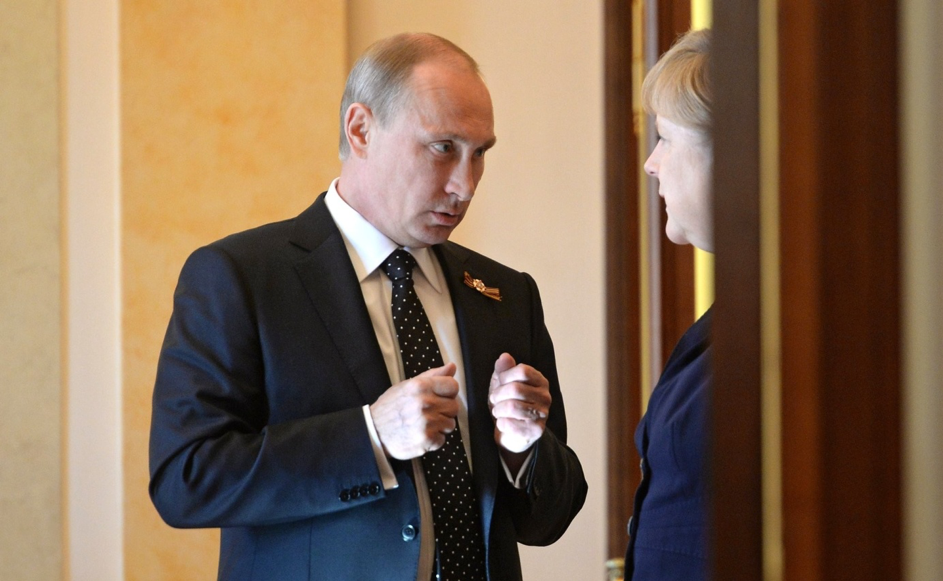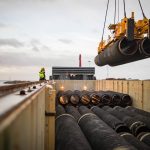RUSSIA MONITOR
Date: 18 April 2018
Nord Stream 2. Berlin is holding up, time is running
Russia and Germany regroup their forces in the battle of Nord Stream 2 project realisation. Both countries play the game. They try to lure their project opponents with maintaining Russian gas transit through Ukraine after 2019. Angela Merkel and members of her parliament are sending subtle signals suggesting a slow change of their stance on Moscow. Meanwhile, Nord Stream 2 is receiving permissions for construction, and in Brussels there is a bruising struggle among lobbyists for the shape of rules regulating the pipeline functioning. In the meantime, time is running and the takeover of EU presidency by Austria, a strong advocate of Nord Stream 2, is getting closer. What is worse, the behaviour of currently presiding Bulgaria is also unpredictable – authorities in Sofia are full of pro-Russian politics.

On April 17 President of Russia Vladimir Putin had a phone conversation with Chancellor of Germany Angela Merkel about aggravated situation in Syria. What is interesting, at the very end of a short announcement published by the Kremlin it is also mentioned that leaders of Russia and Germany exchanged opinions on “matters connected with realisation of the Nord Stream 2 pipeline project”. This is not surprising in the light of recent events and words coming from Berlin, even from Merkel herself.
During a meeting with president Petro Poroshenko she announced that Ukraine should remain a transit country for Russian gas, regardless of the realisation of Nord Stream 2. She repeated it on the joint press conference in Berlin with PM of Denmark Lars Løkke Rasmussen. Chancellor for the first time has admitted that Nord Stream 2 was also of political nature. Is it a sign of a change in Berlin’s stance – as “Financial Times” would like it to be? Nothing of the kind. Germans do not distance themselves from the project, they are only making insignificant gestures due to worse political atmosphere around Russia (Skripal’s poisoning, banishment of diplomats, clash in Syria). The reality is different. German authorities have already given all permissions for pipeline construction, and talking about guarantee of Russian gas transit through Ukraine is meaningless. It has long been known that even if Gazprom built a second line of Nord Stream and Turkish Stream in the south, the pipelines which bypass Ukraine, even with their full capacity, will not be able to transport all the raw material exported to Europe. Either way, transit has to be maintained – even though Gazprom was saying that they would not prolong the deal which expires in 2019. Now, using the German rhetoric, Moscow proposes unfavourable transit offers to Kiev. First of all, it offers a transport of so small amount of material, that economically it would not be profitable for Ukraine at all. But the real Gazprom’s attitude towards Ukraine is visible in constant refusing to realise an award of international arbitration, which includes, among others, paying much money to Naftogaz of Ukraine.
German assertions that it is inevitable to maintain the transit in Ukraine are addressed to officials from EU and countries opposing to Nord Stream 2 construction. It can be considered as an attempt of dividing the project opponents’ camp. The fact that for them the defence of Ukraine is as important as the struggle with increasing Russian gas domination in Europe is even more persuading. Unfortunately, it seems that the German operation is effective. On April 16 Vice-President of the European Commission Maroš Šefčovič after his meeting with German Minister of Economic Affairs and Energy Peter Altmaier, announced that Brussels appreciated the latest statement by Angela Merkel on the Nord Stream 2 case. According to Šefčovič her stance means that the dialogue among Ukraine, Russia and European Commission about Ukrainian transit could be joined by…Germans – the country which weakens Ukraine with real gas activities, instead of supporting it.
For instance by being against (with Austria, the Netherlands and Belgium) new EU regulations on Nord Stream 2. Works in Council of the European Union on the project of gas directive aimed at Nord Stream 2 are delaying. Meanwhile, the time of EU presidency by Austria (the beginning of July), which for sure will do everything to make Nord Stream 2 come into being (Austrian OMV is engaged in the project), is coming. It is unknown whether Bulgarians currently presiding over EU would want to take the stance of Council of EU, which would enable them the participation in negotiations over the final shape of rules. It is necessary to remember that Sofia is one of more pro-Russian capitals of the EU.
All texts published by the Warsaw Institute Foundation may be disseminated on the condition that their origin is credited. Images may not be used without permission.














